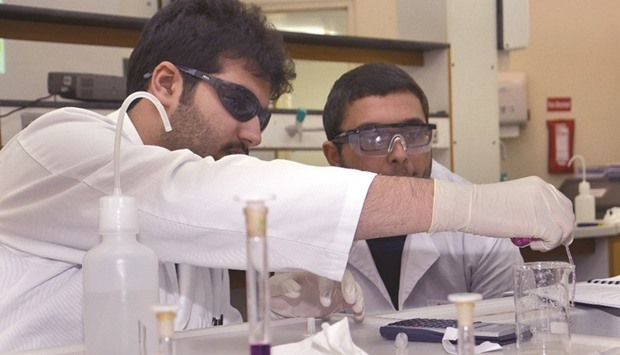Qatar University (QU) has said it offers 74 specialisations, which make up the “widest range of academic programmes” which are tailored to meet the needs of the Qatari society.
Of these, 40 are Bachelors programmes, 25 Masters, four PhDs, four diplomas, and one PharmD.
“Since its inception in 1973, Qatar University continues to build on a legacy of solid commitment to graduating students who will contribute to the progress and development of Qatar. With more than 17,000 students in its ranks, QU is today a beacon of academic and research excellence in the GCC region,” the university said in a press statement.
QU has stressed that it provides its students with opportunities that contribute to heightening their skills and fostering their experiences to become the next generation of professionals and leaders who can drive the country’s progress in line with the Human Development Strategy. “The university prides itself on the quality of its students and alumni – its alumni body totals 40,000 members, many of whom are top leaders in the private and public sectors in Qatar,” the statement noted.
QU’s academic programmes are aligned with established international standards and best practices, and the university has also signed some 59 agreements with local and international institutions in 2015/2016 in order to advance its goal to become a leader of economic and social development in Qatar through partnerships with industry, government, academia, business and civil society in Qatar and beyond.
Official surveys conducted in recent years revealed high percentage rates (84%) in terms of the quality of QU programmes, employers attesting to seeking QU graduates to join their respective companies and organisations (80%), and employer perception of QU as a symbol of national identity (95%).
Meanwhile, an ambitious research roadmap was launched in 2014 to outline a set of research priorities that reflects the responsibility and commitment of the organisation to support research that is responsive to national priority needs and major challenges facing Qatar.
In its roadmap, the organisation established a focus on interdisciplinary research projects centred on four areas of excellence: Energy, Environment & Resource Sustainability; Social Change and Identity; Population, Health and Wellness; and Information, Communication and Technologies.
The university is committed to ensuring that campus life is an “enriching environment for encouraging academic excellence, volunteerism, civic responsibility and leadership”. It also provides a wide range of programmes such as Al Bairaq, Life is Engineering Project, Gasna and the Annual Computing Contest aimed at raising school students’ awareness of their future role in contributing to the country’s development.
This year, QU has started its strategic transformation towards the achievement of a ‘QU Model’. This strategy focuses on advancing QU role as Qatar’s premier national university that provides high-quality education and strengthening its position as a social and strategic partner in national development, while maximising admission opportunities and providing smooth opportunities for students.
Further, the university has adopted a number of indicators to benchmark its strategic achievements. These include an increase in the percentage of students graduating within the period of four years to 60%, a decrease in the period spent by students at the university to graduate from 5.9 years to 4.5, the establishment of five interdisciplinary research centres for graduate studies, the increase in professor appointments within the faculty body to 25%, and the enhancement of its position in international rankings to become one of the top 300 universities in the world and among the best 200 universities in at least two minors.

Qatar University promotes high-quality research.
